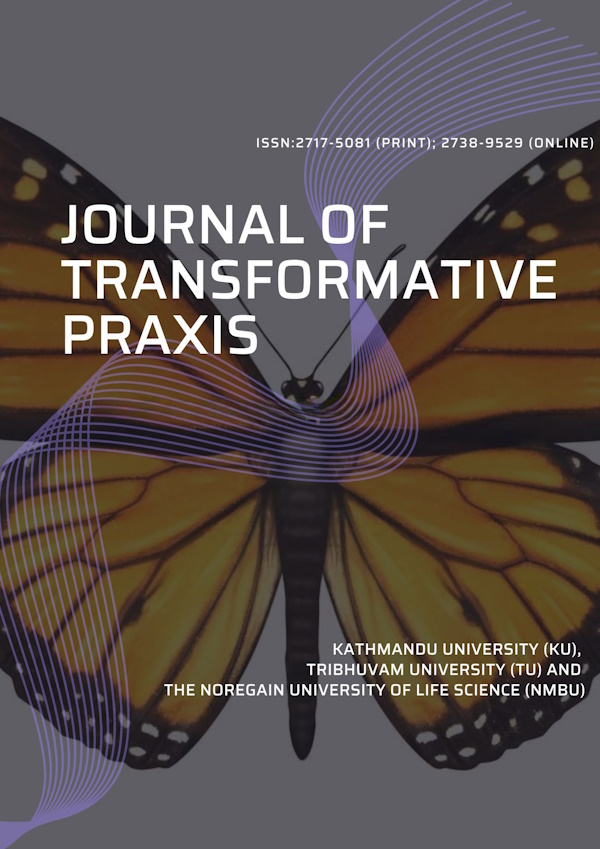
Transformation is Multi-faceted: The Researcher’s Realization of Implementing the STEAM Projects
Original Article
Journal of Transformative Praxis, Volume 6, Issue 1, June 2025, -
Publication date: Jun 30, 2025
Views: 12 | Downloads: 0
How to cite this article
APA
In-text citation: (Pant, 2025)
Reference: Pant, B. P. (2025). Transformation is Multi-faceted: The Researcher’s Realization of Implementing the STEAM Projects. Journal of Transformative Praxis, 6(1), -.
Reference: Pant, B. P. (2025). Transformation is Multi-faceted: The Researcher’s Realization of Implementing the STEAM Projects. Journal of Transformative Praxis, 6(1), -.
Vancouver
In-text citation: (1), (2), (3), etc.
Reference: Pant BP. Transformation is Multi-faceted: The Researcher’s Realization of Implementing the STEAM Projects. Journal of Transformative Praxis. 2025;6(1):.
Reference: Pant BP. Transformation is Multi-faceted: The Researcher’s Realization of Implementing the STEAM Projects. Journal of Transformative Praxis. 2025;6(1):.
AMA
In-text citation: (1), (2), (3), etc.
Reference: Pant BP. Transformation is Multi-faceted: The Researcher’s Realization of Implementing the STEAM Projects. Journal of Transformative Praxis. 2025;6(1), -.
Reference: Pant BP. Transformation is Multi-faceted: The Researcher’s Realization of Implementing the STEAM Projects. Journal of Transformative Praxis. 2025;6(1), -.
Chicago
In-text citation: (Pant, 2025)
Reference: Pant, Binod Prasad. "Transformation is Multi-faceted: The Researcher’s Realization of Implementing the STEAM Projects". Journal of Transformative Praxis 2025 6 no. 1 (2025): -.
Reference: Pant, Binod Prasad. "Transformation is Multi-faceted: The Researcher’s Realization of Implementing the STEAM Projects". Journal of Transformative Praxis 2025 6 no. 1 (2025): -.
Harvard
In-text citation: (Pant, 2025)
Reference: Pant, B. P. (2025). Transformation is Multi-faceted: The Researcher’s Realization of Implementing the STEAM Projects. Journal of Transformative Praxis, 6(1), pp. -.
Reference: Pant, B. P. (2025). Transformation is Multi-faceted: The Researcher’s Realization of Implementing the STEAM Projects. Journal of Transformative Praxis, 6(1), pp. -.
MLA
In-text citation: (Pant, 2025)
Reference: Pant, Binod Prasad "Transformation is Multi-faceted: The Researcher’s Realization of Implementing the STEAM Projects". Journal of Transformative Praxis, vol. 6, no. 1, 2025, pp. -.
Reference: Pant, Binod Prasad "Transformation is Multi-faceted: The Researcher’s Realization of Implementing the STEAM Projects". Journal of Transformative Praxis, vol. 6, no. 1, 2025, pp. -.
ABSTRACT
The researcher implemented a STEAM project in two Nepali public schools using participatory action research (PAR). This study critiques disciplinary egocentrism and the fragmented, subject-based schooling techniques that dominate Nepali classrooms and hamper students' holistic, problem-solving skills. The fundamental question was how co-researchers cooperatively design and implement STEAM-based projects to understand and implement personal, pedagogical, and institutional transformation. Five teachers and STEAM club students planned, acted, and reflected on the research. Stories, reflections, and memos were used as data in the narrative inquiry project. The project “Save the Species: I Keep Water Plates on the Roof for the Birds,” allowed students to design and implement practical, creative, and ethical bird conservation solutions while learning math, science, social studies, engineering, and art. Students considered ethics, ecology, and cultural responsibility while designing bird nests and water plates. Due to course load and cultural expectations of procedural learning, teachers initially opposed the method. Throughout the research, teachers and students had transforming experiences, discovering new ways to learn beyond memorization to critical, creative, and relational levels. Findings show three interrelated transformation aspects. First, transformation as thinking relies on cognitive restructuring and critical reflection, using unsettling dilemmas, cognitive dissonance, and authentic tasks to test assumptions. Second, transformation as an intentional attempt stresses co-researchers and the lead researcher's purposeful, continuing, and frequently uncertain change efforts. This dimension emphasizes transformation as iterative attempts, failures, and professional progress throughout time. Third, change as process emphasizes discourse, scaffolding, and knowledge co-construction over outputs and measurable successes. The study shows that STEAM may integrate disciplinary, cultural, and ethical knowledges to honor local settings and address global issues like sustainability by placing it in a participatory framework. The study explored that STEAM projects through PAR can promote multilayered, transformative learning. It goes beyond procedural to relational, ethical, and imaginative knowledge. The researcher implemented a STEAM project in two Nepali public schools using participatory action research (PAR). This study critiques disciplinary egocentrism and the fragmented, subject-based schooling techniques that dominate Nepali classrooms and hamper students' holistic, problem-solving skills. The fundamental question was how coresearchers cooperatively design and implement STEAM-based projects to understand and implement personal, pedagogical, and institutional transformation. Five teachers and STEAM club students planned, acted, and reflected on the research. Stories, reflections, and memos were used as data in the narrative inquiry project. The project “Save the Species: I Keep Water Plates on the Roof for the Birds,” allowed students to design and implement practical, creative, and ethical bird conservation solutions while learning math, science, social studies, engineering, and art. Students considered ethics, ecology, and cultural responsibility while designing bird nests and water plates. Due to course load and cultural expectations of procedural learning, teachers initially opposed the method. Throughout the research, teachers and students had transforming experiences, discovering new ways to learn beyond memorization to critical, creative, and relational levels. Findings show three interrelated transformation aspects. First, transformation as thinking relies on cognitive restructuring and critical reflection, using unsettling dilemmas, cognitive dissonance, and authentic tasks to test assumptions. Second, transformation as an intentional attempt stresses co-researchers and the lead researcher's purposeful, continuing, and frequently uncertain change efforts. This dimension emphasizes transformation as iterative attempts, failures, and professional progress throughout time. Third, change as process emphasizes discourse, scaffolding, and knowledge co-construction over outputs and measurable successes. The study shows that STEAM may integrate disciplinary, cultural, and ethical knowledges to honor local settings and address global issues like sustainability by placing it in a participatory framework. The study explored that STEAM projects through PAR can promote multilayered, transformative learning. It goes beyond procedural to relational, ethical, and imaginative knowledge.
KEYWORDS
REFERENCES
---
LICENSE
This work is licensed under a Creative Commons Attribution-ShareAlike 4.0 International License.
